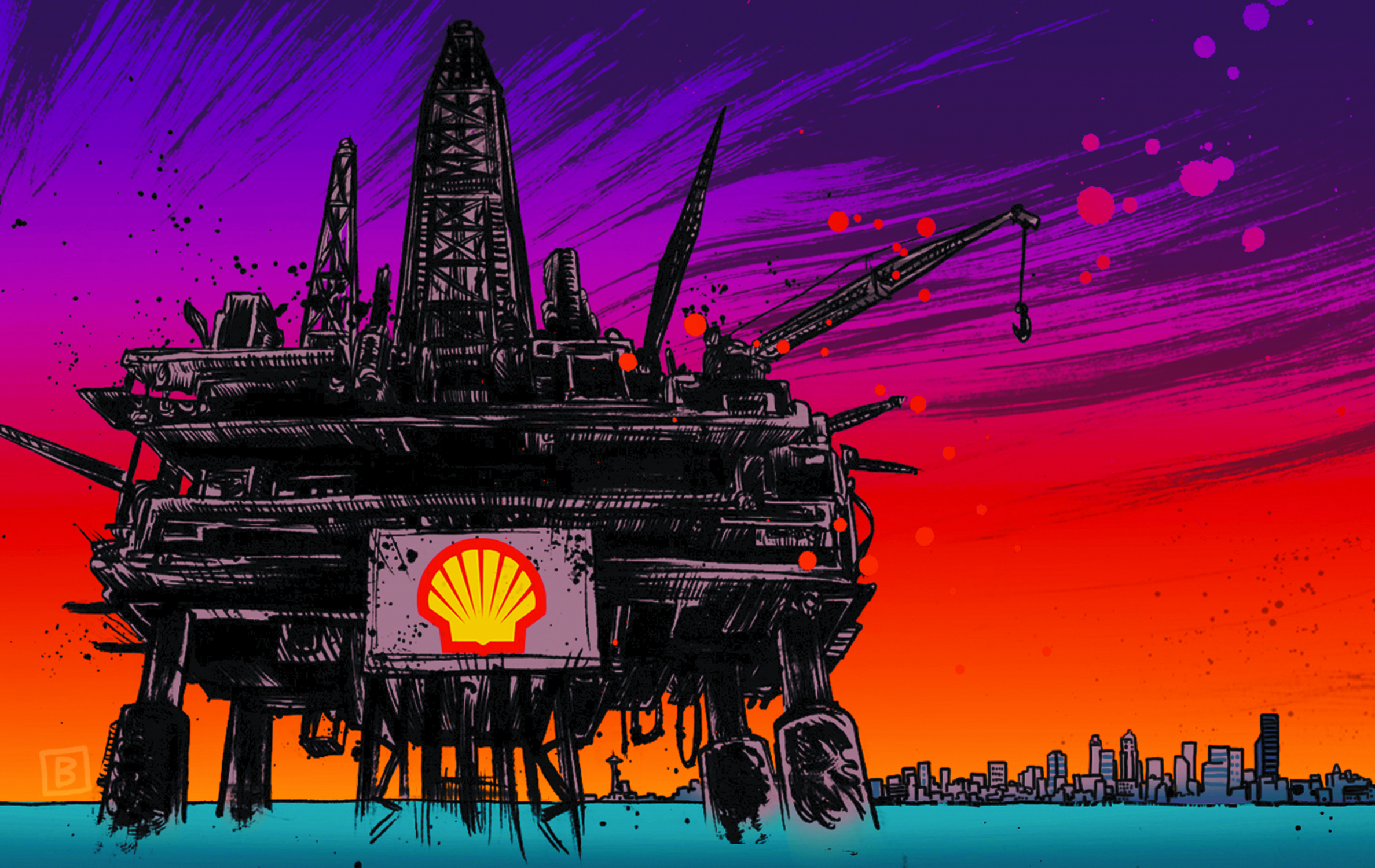Seattle Councilmember Mike O’Brien’s head floats atop Elliott Bay like a beach ball. The rest of his body is submerged in the 50-degree water, a drysuit holding back the bay’s chill. This is his second time in the water today; after an initial embarrassing spill while launching from a rocky, gray beach in West Seattle, he’s reluctantly re-dunked himself in order to learn how to un-capsize his kayak.
“My body didn’t want to go into that water,” says O’Brien afterward, laughing. “It’s, uh, definitely refreshing.”
He’s here with maybe 25 other kayaktivists, training for a row-down showdown against Shell’s Arctic exploration fleet in mid-May (with family-friendly floating protests on May 16, and an unspecified “direct action” on May 18). The oil behemoth intends to drill exploratory wells in the Chukchi Sea off the northwest coast of Alaska, where it hopes to find “some of the most prolific, undeveloped hydrocarbon basins left in North America,” according to Shell spokesperson Curtis Smith. This would be a big, long-term project: If Shell strikes black gold in the cold north, says Smith, that oil won’t appear on the market for more than a decade.
To that end, Shell planned to use Terminal 5 of the Port of Seattle as a repair site for its exploration fleet before setting sail toward frigid, potentially lucrative northern seas. Planned, in the past tense. Now Shell hopes to use Terminal 5, since the Seattle Department of Planning and Development concluded on Monday that the Port played a little bit too fast and loose when it quietly leased Terminal 5 to Shell proxy Foss Maritime earlier this year. Oops: “An additional use permit is required for the proposed seasonal moorage at the Port of Seattle’s Terminal 5 facility of a drilling rig and accompanying tugboats,” the finding stated. Shell will need to get that new permit sooner rather than later if it wants to take full advantage of the Arctic drilling season, which runs from July 1 through October.
Whether or not Shell succeeds is ultimately up to the Port Commission (whose next public meeting is 1 p.m. Tues., May 12 at Pier 69 on Alaskan Way). This is the same commission that originally OK’d the Terminal 5 lease. But it’s also the commission that’s been receiving enormous pressure from the public and other elected officials to find a way to nix that lease.
Port spokesperson Peter McGraw declines to “speak for [the commissioners] or where they’re at” on the issue of a new permit until the Port’s lawyers have reviewed DPD’s finding. “Anything else would just be speculation,” he says.
The DPD’s finding is purely a technical one regarding Port policies, not touching on the environmental impacts of the Shell drilling rig. But don’t think climate change isn’t on the city’s mind. It’s embarrassing, for a city that regards itself as a leader in sustainability, to find itself the repair garage for a fleet that’s endeavoring to drill, baby, drill. Counting the ongoing debate over oil and coal trains through Seattle, the Shell rig is at least the third fight Seattle has had with corporations hoping to use the city as a way point for the carbon industry. Accompanying DPD’s announcement on Monday, Mayor Ed Murray released a statement warning fossil fuel companies that their Seattle headaches won’t subside anytime soon. “To prevent the full force of climate change, it’s time to turn the page on things like coal trains, oil trains, and oil-drilling rigs,” Murray said.
The following day, O’Brien introduced a council resolution asking the Port to pretty-please “reconsider” the lease.
In a city that is famously deliberative about everything it does, Seattle may be fighting for the climate the best way it knows how: Demanding more discussion.
The Bureau of Ocean Energy Management reckons Shell could profitably pull 4.3 billion barrels of crude oil from Alaska’s ocean shore, in part with the rigs soon to be calling port in Seattle. Economists estimate the social cost of the carbon released when that oil is burned—the negative effects which, like a fart in an elevator, don’t have a price tag but end up hurting everyone—to be about $11.23 per burned barrel of oil. That means the rig coming here now could cost society at large $48 billion—real-dollar impacts that stay off Shell’s books and on top of everyone else’s shoulders.”
That’s the lowball cost, Greenpeace wonk John Deans says. As Greenpeace has argued in court, government estimates put the total amount of “technically recoverable” oil beneath the Chukchi Sea at 15.38 billion barrels (although it could be as high as 40 billion).For comparison, total carbon emissions for the lowball estimate would be equivalent to 12.3 years of the proposed Keystone XL pipeline pumping at full capacity; the highball estimate would be equivalent to 44 years. Not all that oil would be pumped by the rigs heading for Seattle, but Deans cautions that the Chukchi project is a kind of test run for other drilling in the Arctic, which already has 10 percent of the world’s known oil reserves and is estimated to hold another 90 billion undiscovered barrels. If the Chukchi project succeeds, Shell and other companies may decide it’s worth their while to invest in more Arctic drilling.
It’s unclear how long this city—between its kayaktivists and the infamous “Seattle process”—will be able to hold off the exploration. But if O’Brien’s head bobbing in Elliott Bay is any indication, it will be spectacle as long as it does.
“A lot of folks have said, ‘Look, this is a done deal. Like it or don’t like it, there’s not much we can do about it,’ ” says O’Brien. “There’s now something we can do about it.”
cjaywork@seattleweekly.com








